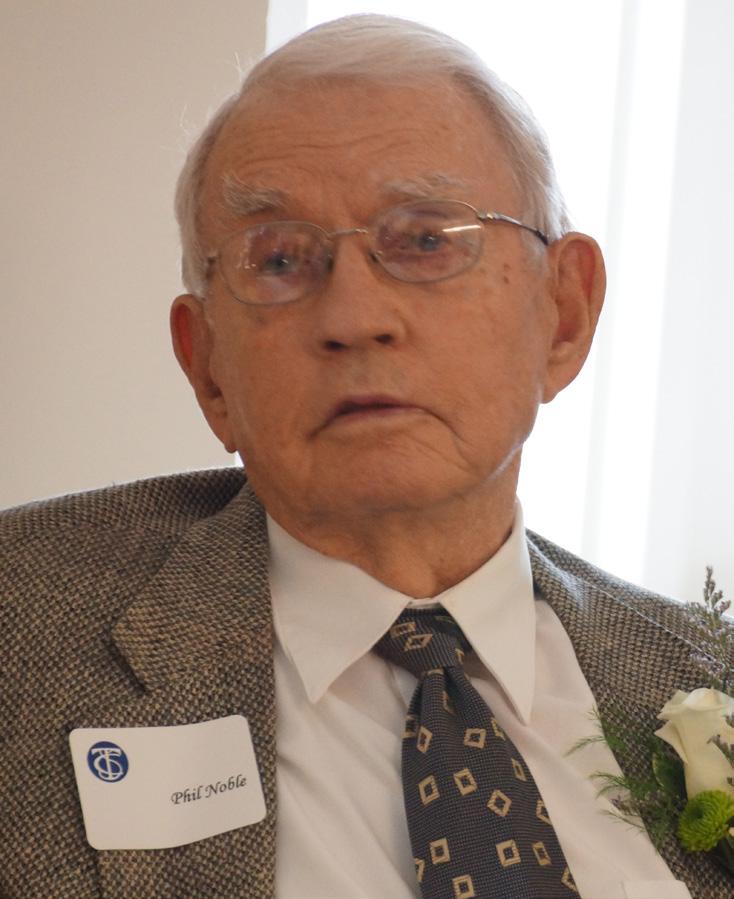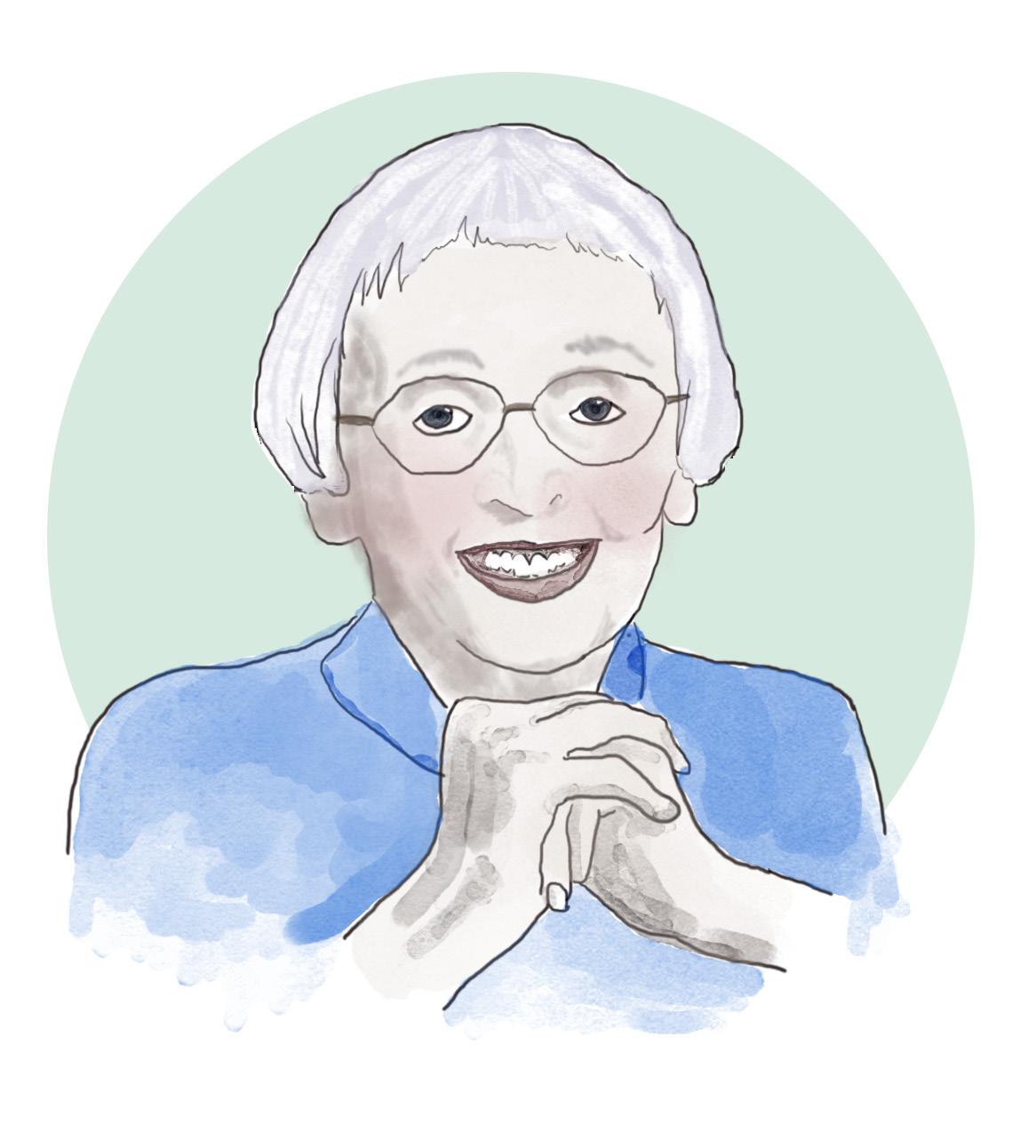
9 minute read
Seminary News
Timeline Looks at Columbia’s Links to Slavery and Racism
The C. Benton Kline, Jr. Special Collections created A Window into the Breach: Theology and the Economy of Slavery at Columbia Theological Seminary, 1824-1899, a timeline consisting of 41 slides looking at racism and the institution of slavery in the 19th century as it relates to the history of Columbia Theological Seminary.
Many of the slides focus on the earliest and largest donations that the seminary received prior to emancipation, as well as publications, events, and individuals associated with the seminary through this time, including Thomas Smyth, James Henley Thornwell, and John Lafayette Girardeau. Select post-Civil War events and individuals are also highlighted as specifically related to racism and the seminary, memory of the Civil War, and Presbyterian churches throughout the South.
Enslaved Africans and African Americans contributed their lives while in bondage to the flourishing and growth of Columbia Theological Seminary in the Antebellum South and it is to this end that their names have been given when available.
(Please note that some of the slides contain information that may be sensitive to some viewers.)
TCI@CTS Is Virtual
The Center for Lifelong Learning (CLL) at Columbia Theological Seminary implemented an all-virtual format for the 2021 Cohort of TCI@CTS, The Coaching Institute at Columbia Theological Seminary. This is the third year that the CLL has offered this certificate program and the first all-virtual format. Its instructors are accredited by the International Coach Federation.
“Based on the recommendations of our TCI@CTS leadership team, and in response to inquiries from potential participants, we made the decision to convert to an online format to assure the fullest possible participation and sufficient time to plan for an engaging, practice-oriented formal program,” said
Dr. Sarah Erickson, Director of Lifelong Learning. “The leadership team, with more than 13 years of experience leading this program, is hard at work making the necessary revisions in order to deliver another high-quality, effective coach training.”
“This coaching program has expanded our offerings to support the professional development of clergy and other church leaders in various contexts of ministry,” said Erickson. Coach Coordinator Laurie J. Ferguson added, “After twenty-one years of coaching, I remain excited about how these skills support and expand ministry. We are in a time when the gospel faces deep challenges, and leaders also see great opportunity. Coaching is uniquely poised to help leaders focus on their mission and create new ways to live out God’s mission particularly in this season of extended disruption such as the recent pandemic.”
The core training team is composed of Ferguson and colleagues Philip C. Bergey and Chris Holmes. Youngsook Kang and Jihyun Oh round out the TCI@CTS training team.
Complete details about TCI@CTScan be found at https://www.ctsnet.edu/ lifelong-learning/certificate-programs/ coaching-institute/.
For more information about the Center for Lifelong Learning and their other courses and certificate programs, visit www.ctsnet.edu/lifelong-learning or email the CLL at LifelongLearning@ ctsnet.edu.
Historic Promotion of Dr. Ralph Basui Watkins to Full Professor
The First African American Male Full Professor and Endowed Chair in Columbia Theological Seminary’s Nearly 200-Year History
On June 15, 2020, the Columbia Seminary Board of Trustees unanimously approved the promotion of Dr. Ralph Basui Watkins, MFA, DMin, PhD to full professor. Previously, Dr. Watkins was the first African American male to be installed in an endowed chair when he was named the Peachtree Chair of Evangelism and Church Growth on October 2, 2019.
“Dr. Watkins is committed to leading the church into the future while not forgetting or abandoning its historical roots. He is committed to helping the church lead what he calls ‘fully digitally integrated lives’ that embrace both the old and the new,” says Dr. Love Sechrest, Dean of Academic Affairs. “His writing and work have been focused on leading the church into the digital age with a focus on reaching young adults.”
“I am deeply honored be a part of this great faculty and I especially thank our President, Dr. Leanne Van Dyk, for her leadership,” Dr. Watkins says. “Dr. Van Dyk, along with the leadership of the school have supported me and my work from day one and were committed to supporting my promotion. With her leadership, it happened. I am honored to be a part of a world class faculty, and I am fortunate to serve with each of them” Dr. Watkins is a regular preacher and workshop leader for churches, denomination bodies and presbyteries across the United States. He has over twenty-five years pastoral ministry experience, most recently serving as the Senior Pastor of the Historic Wheat Street Baptist Church in Atlanta, Georgia.
Dr. Watkins is considered a national leader in digital and online teaching and learning and has led national workshops on the topic of teaching in the visual age. Dr. Watkins’ forthcoming book from Judson Press is The Fully Digitally Integrated Ministry: Integrating the Old and the New. He was the executive producer and host of the television show Religion Roundtable with Dr. Ralph Basui Watkins on the Atlanta Interfaith Broadcasting Network where his show was the top-rated show on the network for five years.
He is also a leader with the Louisville Institute where he mentors doctoral students. He is on the board of the Wabash Center for Teaching and Learning in Theology and Religion where he writes a monthly vlog / blog, leads workshops, and mentors junior faculty.
It was under the leadership of the late Columbia Seminary President Dr. Steve Hayner and retired Dean Deb Mullen that Dr. Watkins was brought to CTS from Fuller Seminary in Pasadena, California. While at Fuller Dr. Watkins was the Assistant Dean for African American Church Studies and Associate Professor for Society, Religion and Africana Studies.
Committing to Repair the Breach Caused by White Supremacy
Deepening Columbia’s Commitment to Black People and Their Flourishing Columbia has wrestled with its history and participation in the enslavement and oppression of Black people. On Monday, June 15, 2020, the Board of Trustees met via Zoom to continue wrestling with Columbia’s history and future. The board meeting occurred in the midst of a national outcry for justice on behalf of the killings of Ahmaud Arbury, Breonna Taylor, George Floyd, and Rayshard Brooks. Within this context, the Board of Trustees voted to unanimously affirm a commitment statement titled, “Repairing the Breach: Deepening Columbia’s Commitment to Black People and their Flourishing.” The commitment statement explicitly outlines steps Columbia as implemented to begin directly addressing the harm that slavery and its aftermath have done to Black people and communities. New commitments included:
• Full tuition and fees for all Black students who apply and are admitted to masters-level degree programs;
• Naming Columbia’s signature residence hall Marcia Y. Riggs
Hall (Riggs Commons) in public recognition of her groundbreaking research, teaching, and dedication to this seminary that has often failed to fully appreciate and celebrate her contributions and the those of other Black scholars;
• Implementation of new policies to develop external partnerships with and support for others who are actively working to combat police brutality and anti-Black racism. Columbia’s board, leadership, faculty, staff, and student body have collectively acknowledged that these new commitments represent one step toward dismantling systems of oppression. Therefore, the Board also reaffirmed a commitment to long-term processes that work to disrupt global cycles of oppression and create new realities at Columbia and beyond.
Reflecting on this new commitment, Columbia President Van Dyk stated, “Columbia is more diverse than it has ever been. We work together and challenge one another to put our faith into action. Now is a time for us to move beyond conversations and toward concrete actions that decenter whiteness, center Black and brown people, and transform the structure of this seminary. We are committed to the long journey — and, we are committed to doing this tough work together.”
The full text of “Repairing the Breach,” as well as additional information about other Columbia commitments to equity, diversity, and inclusion, can be found at https://www.ctsnet. edu/home/repairing-the-breach/.

Dr. J. Phillips Noble
Columbia Archives to Receive Dr. J. Phillips Noble Papers
The C. Benton Kline, Jr. Special Collections and Archives is pleased to be the future home of the J. Phillips Noble papers. A 1945 graduate of Columbia Theological Seminary, Noble served on the CTS Board of Trustees for twenty-four years and worked alongside Reverend William B. McClain and Reverend Nimrod Q. Reynolds to help peacefully bring about desegregation in 1960s Anniston, Alabama. In 2020, Noble celebrated the release of his fourth book of poetry and his 99th birthday.
After graduating from CTS, Noble served congregations in Georgia and South Carolina before becoming the pastor of First Presbyterian Church in Anniston. During this time, he was introduced to Reverend McClain and Reverend Nimrod, and the three ministers met regularly as the Anniston Ministerial Association. The organization supported worship and conversations across racial lines and was instrumental in integrating the local library, a gesture that engendered the unraveling of segregation across the city. Noble brought his experience with racial justice to his twentyfour years on the CTS Board of Trustees. Throughout this time, he was acting Chairman in 1966 and Chairman from 197983. He served on the Committees of Laws and Regulations, Toward 2000, Nominations, the Joint Committee of Faculty and Trustees, Mission Haven, Business Management, and the Executive Committee.
The anticipated papers include sermons, correspondence, and material that documents his tenure on the Board of Trustees and his leadership in Anniston, which Noble has written about in his book, Beyond the Burning Bus: The Civil Rights Revolution in a Southern Town. It has been a pleasure working with the Noble family, and the archives thank them for their generous gift. It is our hope that engaging with Noble’s papers will allow new narratives to emerge in the CTS community.
Remembering Elizabeth Anne “Betsey” Burgess

The Columbia community mourns the loss of Betsey Burgess, long-serving former staff associate and namesake of the Betsey Burgess Award, established “for one who has demonstrated faithfulness, dedicated service, and Christian character upholding the seminary’s purpose and mission.”
Betsey was the only child of John and Clara Bulger. She graduated from the University of Buffalo (1948) and Princeton Theological Seminary (1951), in one of the first classes to include women (Master of Religious Education). She served in National Ministries of the United Presbyterian Church in Booneville, KY (1951-53), and on May 2, 1953, married Charles S. Burgess, a classmate at Princeton Seminary.
From 1953-1974, she served with her husband in ministries in: Denver, CO; El Paso, TX; San Antonio, TX; and Atlanta, GA. After her husband's sudden death from a heart attack (1974), she faithfully raised their four children (John, David, Mark, and Grace) and served as staff associate at Columbia Theological Seminary in Decatur, Georgia.
She was a founding member of the Christ Presbyterian Church (UPC) in Dunwoody and served as an elder there for several years. Following reunion, she was an active elder in the newly formed Church of the New Covenant, a merger of Christ Church and Northwoods Presbyterian Church (PCUS) in Doraville. She was active in all parts of the life of the church prior to her retirement.
Upon her retirement, she moved to Monte Vista Grove Homes in Pasadena, CA (1999), where she found dear friends and a vibrant faith community. She touched others through her warm hospitality, delicious cookies, and thoughtful notes and gifts. “Betsey was a dedicated employee of Columbia, caring deeply for the faculty, staff, and students. Her commitment showed in the numerous ways as she dedicated her life to the seminary’s life, work and worship,” says Clark Simmons, Senior Consultant for Southeastern United States Board of Pensions. “She was a quiet person but, oh, so feisty.”
Betsey is survived by her four children and eight grandchildren: Riley (Hannah), Luisa, Rachel, Jordan, Charles, Maggie, Krista, and Cara. Due to the pandemic, a memorial service will be scheduled later in 2021 at Monte Vista Grove









